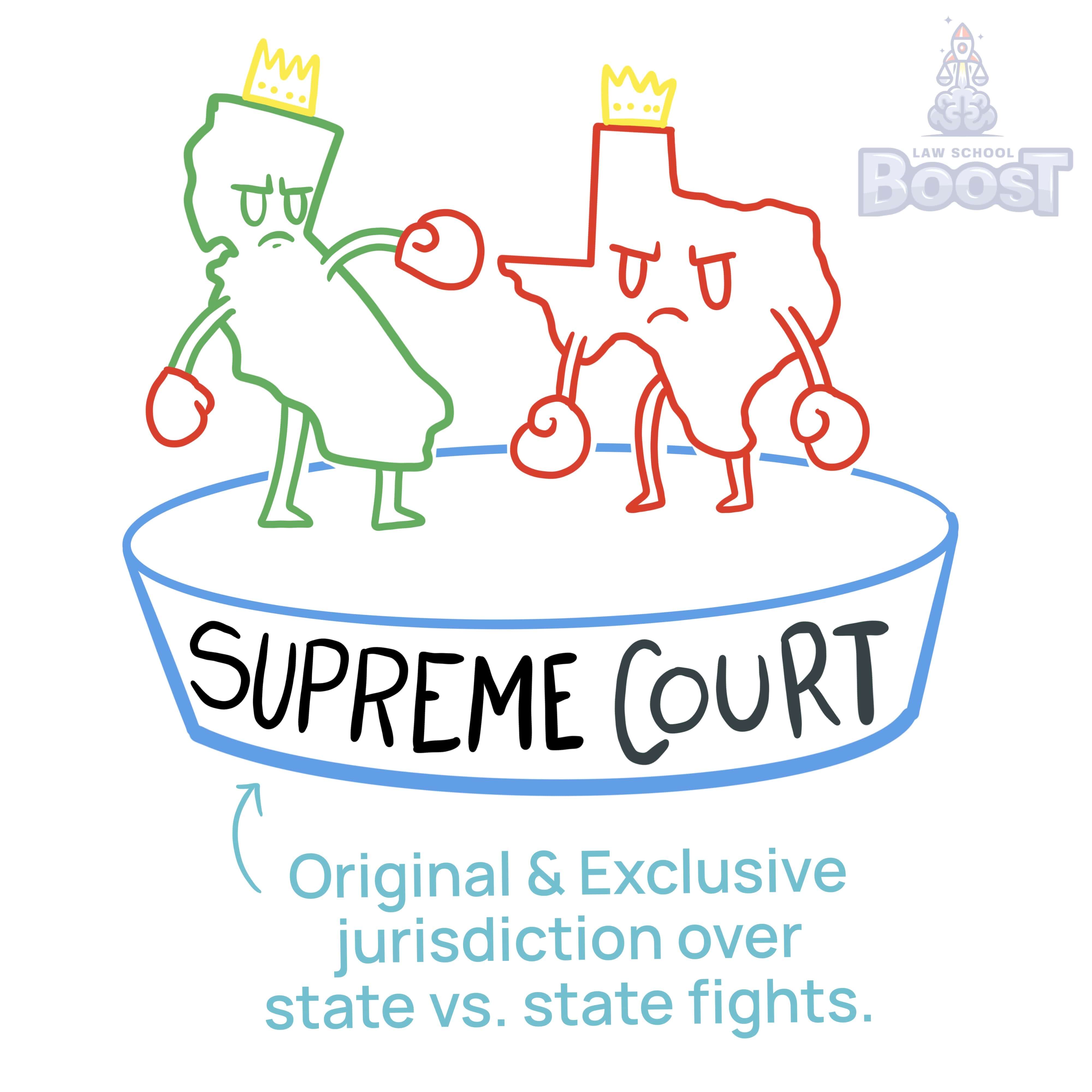🇺🇸
Constitutional Law • Supreme Court Review
CONLAW#011
Legal Definition
The Supreme Court has original and exclusive jurisdiction over suits between state governments.
Plain English Explanation
Imagine the United States as a big neighborhood, where each state is a house with its own rules. Now, sometimes, these houses have disputes, maybe over where one yard ends and another begins, or how they share resources like water. Normally, when people have disagreements, they might go to a local mediator or a small court to sort things out. But when two states have a beef, it's a big deal. They can't just go to any court because their issues often impact lots of people and involve big, important rules.
That's where the Supreme Court comes in, kind of like the head of the neighborhood association with the final say. The Constitution gives the Supreme Court the special job of being the first and only place where states can bring their arguments against each other. This rule exists to ensure that disputes between states are treated with the utmost seriousness and impartiality, given how much could be at stake. It's about keeping the peace in the neighborhood and making sure that any solution is fair, considering the whole country's laws and values.
This setup helps avoid confusion and ensures that the same high-level court hears all state vs. state disputes, maintaining consistency in how laws are applied.
That's where the Supreme Court comes in, kind of like the head of the neighborhood association with the final say. The Constitution gives the Supreme Court the special job of being the first and only place where states can bring their arguments against each other. This rule exists to ensure that disputes between states are treated with the utmost seriousness and impartiality, given how much could be at stake. It's about keeping the peace in the neighborhood and making sure that any solution is fair, considering the whole country's laws and values.
This setup helps avoid confusion and ensures that the same high-level court hears all state vs. state disputes, maintaining consistency in how laws are applied.
Hypothetical
Hypo 1: Hypofornia and New Hypoland have a disagreement over water rights. Hypofornia believes New Hypoland is using more than its fair share of water from a river that flows between the two states. Unable to resolve the issue on their own, Hypofornia decides to take New Hypoland to court. Result: Since this is a dispute between two states, the Supreme Court has original and exclusive jurisdiction. The Supreme Court would hear the case, consider the laws and agreements about water sharing, and make a decision to resolve the conflict.
Hypo 2: Hypofornia passes a law that New Hypoland believes unfairly restricts its businesses from operating in Hypofornia, claiming it violates a commerce agreement between the states. New Hypoland decides to challenge this law. Result: This dispute between states over a law affecting commerce would be directly taken to the Supreme Court. The Court would review the commerce agreement and the contested law to decide if Hypofornia's law is lawful or needs to be changed.
Hypo 3: Bob, a resident of Hypofornia, is unhappy with a new environmental policy implemented by New Hypoland that affects the air quality in his state. He wants to sue New Hypoland. Result: While Bob might be affected by the policy, this situation doesn’t involve a direct suit between state governments. Bob would need to seek legal action in a lower court first, not the Supreme Court. This example shows the rule doesn’t apply because it’s an individual suing a state, not a state vs. state lawsuit.
Hypo 2: Hypofornia passes a law that New Hypoland believes unfairly restricts its businesses from operating in Hypofornia, claiming it violates a commerce agreement between the states. New Hypoland decides to challenge this law. Result: This dispute between states over a law affecting commerce would be directly taken to the Supreme Court. The Court would review the commerce agreement and the contested law to decide if Hypofornia's law is lawful or needs to be changed.
Hypo 3: Bob, a resident of Hypofornia, is unhappy with a new environmental policy implemented by New Hypoland that affects the air quality in his state. He wants to sue New Hypoland. Result: While Bob might be affected by the policy, this situation doesn’t involve a direct suit between state governments. Bob would need to seek legal action in a lower court first, not the Supreme Court. This example shows the rule doesn’t apply because it’s an individual suing a state, not a state vs. state lawsuit.
Visual Aids



